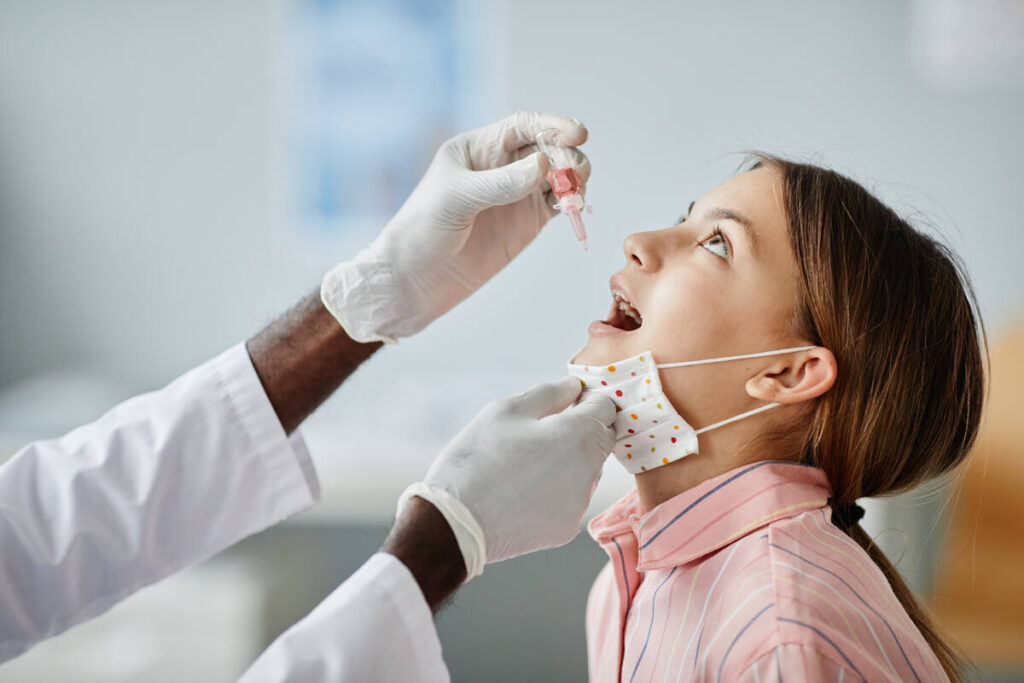Cholera Vaccine
At Travel Vaccine Clinic, we offer the cholera vaccine as an effective preventive measure against the infection. The vaccine is administered orally in the form of a drink. Adults typically require two doses, which should be taken 7 days apart. Cholera outbreaks are typically found in regions with poor sanitation systems. Additionally, areas affected by war or natural disasters are at higher risk of experiencing cholera epidemics.
We offer a wide range of travel vaccinations at a range of locations across the UK. Whether you need vaccinations for travel purposes or for work, we are here to help you. We offer free travel consultations so you can travel safely and confidently.
£95 per course
Suitable for ages 2+
2 doses taken orally

Free Travel Consultations
Stay protected during your travels with our Travel Vaccination Consultation. Our expert medical team will guide you on essential vaccinations, helping prevent diseases uncommon in the UK. Learn how to minimise the risk of exposure and ensure a safe and healthy journey.
Travel Vaccinations
What is Cholera?
Cholera is a bacterial infection that can have severe consequences if left untreated. It causes intense diarrhoea, leading to dehydration, and can be fatal in some cases. The infection is typically contracted by consuming contaminated food or drink. However, with the right precautions and timely vaccination, the risks can be significantly reduced.
What are the symptoms of Cholera?
After exposure to the cholera bacteria, the incubation period can last anywhere from 12 hours up to 5 days. It’s important to be aware of the potential symptoms:
- Around 75% of individuals infected with cholera will experience mild symptoms.
- Individuals with underlying health issues are more susceptible to developing severe illnesses.
- In severe cases, rapid onset of diarrhoea and vomiting can lead to extreme dehydration, which requires immediate medical attention to avoid life-threatening complications.
High-Risk Areas
Cholera outbreaks are typically found in regions with poor sanitation systems. Additionally, areas affected by war or natural disasters are at higher risk of experiencing cholera epidemics. Countries such as Kenya, Nigeria, Malawi, Democratic Republic of Congo, Afghanistan, and Iraq have witnessed cholera outbreaks in the past. However, it’s crucial to stay informed about current conditions in specific locations before travelling.
Preventative Measures
When travelling to high-risk areas, there are several important steps you can take to minimise the chances of contracting cholera:
- Practise good hygiene: Always wash your hands thoroughly with soap, especially before preparing food or beverages.
- Avoid tap water: Refrain from drinking water from unknown sources. It’s safer to rely on bottled or boiled water for consumption.
- Dental hygiene: Brush your teeth using boiled or bottled water to avoid any potential contamination.
- Proper food preparation: Exercise caution with uncooked vegetables. Ensure they are thoroughly washed and prepared before consumption.
- Ice and seafood: Avoid consuming ice in your drinks and be cautious when consuming seafood or shellfish.
The Cholera Vaccine
At Travel Vaccine Clinic, we offer the cholera vaccine as an effective preventive measure against the infection. The vaccine is administered orally in the form of a drink. Adults typically require two doses, which should be taken 7 days apart. After completing the vaccine course, adults are protected for two years. Children may require additional boosters, with up to 3 boosters recommended for optimal protection.
To ensure the vaccine’s efficacy, it’s essential to follow certain guidelines. Prior to your vaccine appointment, avoid eating or drinking for at least one hour before and after the appointment. This will help maximise the vaccine’s absorption and effectiveness.
Cholera Side Effects
While the cholera vaccine is generally safe, there are certain considerations to keep in mind:
- Children under two years old should not receive the vaccine.
- Side effects are rare, but some individuals may experience headaches, fever, or digestive problems. These symptoms typically occur in approximately one in 100 patients and severe reactions remain extremely rare.
How Long Does the Cholera Vaccine Last?
The vaccination is administered orally. Adults should receive two doses, spaced 1 to 6 weeks apart, to ensure protection for up to 2 years. Both doses must be completed at least one week prior to travel.
How much do Travel Vaccinations cost?
Yellow Fever Vaccine (Includes Certificate)
£95
Hepatitis A (Booster after 6-12 months)
£50
Typhoid (Covers for 3 years)
£50
Diptheria, Tetanus & Polio (Covers for 10 years)
£50
Malaria Tablets
£25
Hepatitis B (Course of 3 vaccines – £195)
£65
Rabies (Course of 3 vaccines – £195)
£65
Japanese Encephalitis (Course of 2 vaccines – £250)
£125
Meningitis ACWY (Covers for 3-5 years)
£75
Cholera (Course of 2 vaccines)
£95
Whooping cough vaccine (Pertussis) (Pertussis combined with D/T/P)
£75
Travel Vaccines
Malaria is a life-threatening disease that occurs in tropical and subtropical regions, including Africa, Asia, and South America. If you’re planning a trip to these regions, it’s essential to take the necessary precautions to prevent malaria.
Antimalarial medication is essential for preventing malaria in high-risk areas. Consult with a travel health specialist to determine which medication is right for you. Some medications must be taken several weeks before your trip, so plan ahead.
When selecting a mosquito repellent, make sure it’s effective and safe. Choose a product that contains at least 20% DEET or an equivalent concentration of other active ingredients.
If you’re planning to travel to an area with a high risk of polio or diphtheria, it may be necessary to get vaccinated against polio, diphtheria, and tetanus. The need for a DTP booster shot depends on the date of your previous vaccination.
The polio, diphtheria, and tetanus vaccine is a combination vaccine that protects against these three serious illnesses. Polio is a highly infectious disease that can cause paralysis, while diphtheria and tetanus are bacterial infections that can lead to respiratory problems and muscle stiffness. The vaccine works by stimulating the immune system to produce antibodies against these illnesses, which helps to protect against them.
The hepatitis A vaccine is a preventive measure against hepatitis A, an infection that targets the liver. This disease is caused by the hepatitis A virus (HAV). If you plan to travel to high risk areas, it is essential to assess your risk and take appropriate precautions to safeguard your health.
Hepatitis A is a highly contagious virus that is typically not acquired in the UK. This virus primarily targets the liver, resulting in various symptoms such as abdominal discomfort, jaundice, dark-colored urine, fever, diarrhea, and nausea. It’s important to note that unlike other forms of hepatitis, such as Hepatitis B, Hepatitis A does not lead to long-lasting liver damage or cirrhosis. However, in rare cases, Hepatitis A can progress to liver failure, which can be life-threatening, especially among older individuals.
The most effective method of preventing Hepatitis B infection is through vaccination. The Hepatitis B vaccine is safe and highly effective. If you plan to travel to high risk areas, it is essential to assess your risk and take appropriate precautions to safeguard your health.
Hepatitis B is a viral infection that primarily targets the liver, leading to acute illness and potentially causing long-lasting damage. This global health challenge affects millions of individuals across nearly every continent. According to the World Health Organization (WHO), there were approximately 296 million cases of Hepatitis B in 2019, resulting in an alarming 820,000 deaths attributed to liver damage and liver cancer. The highest concentration of cases can be found in the WHO Western Pacific and African regions.
A typhoid vaccination is recommended if you are travelling to an area of high risk, such as the Indian subcontinent, parts of Africa, South America, and other regions with low hygiene standards. The typhoid vaccine is a crucial preventive measure that stimulates your body to produce antibodies, enhancing your immune system’s ability to fight against the typhoid bacteria.
Typhoid fever is a serious bacterial infection that can have severe consequences if left untreated. It spreads throughout the body, affecting multiple organs and can even lead to complications such as internal bleeding, which can be fatal. It is primarily prevalent in areas where hygiene standards are low.
The Meningitis ACWY vaccine is highly recommended for individuals traveling to regions with a high risk of meningococcal meningitis, including parts of Africa, the Middle East, and certain countries in South America. This vaccine serves as a crucial preventive measure, stimulating the production of antibodies in your body and enhancing your immune system’s ability to combat the bacteria responsible for meningococcal meningitis.
To safeguard against this disease, the Meningitis ACWY vaccine provides protection against four different serogroups of the bacteria: A, C, W, and Y. By receiving this vaccine, individuals can significantly reduce their risk of contracting the disease and potentially protect themselves from its debilitating consequences.
Japanese Encephalitis (JE) is a viral infection transmitted through mosquito bites that is prevalent in certain regions of Asia, including rural areas of China, Japan, Southeast Asia, and the Indian subcontinent. If you are planning to travel to these high-risk areas, it is strongly recommended to receive the Japanese Encephalitis vaccine as a preventive measure.
The Japanese Encephalitis vaccine stimulates the production of antibodies in the body, enhancing the immune system’s ability to fight against the JEV. By receiving this vaccine, you can significantly reduce the risk of contracting the virus and developing Japanese Encephalitis.
Rabies is a deadly viral disease that affects the nervous system of mammals, including humans. It is primarily transmitted through the bite or scratch of an infected animal, most commonly dogs, bats, raccoons, and other wild animals. If you are traveling to areas where rabies is prevalent, it is crucial to be aware of the risks and take preventive measures, including the rabies vaccine.
The rabies vaccine serves as a preventive measure to protect individuals from contracting the virus. It is administered before potential exposure or as a series of post-exposure shots, depending on the circumstances. Pre-exposure vaccination is recommended for individuals who may be at an increased risk of exposure, such as animal handlers, veterinarians, and individuals traveling to regions where rabies is prevalent.
Yellow fever is a viral disease caused by the yellow fever virus, primarily transmitted through the bite of infected mosquitoes. It is mainly found in tropical and subtropical regions of Africa and South America. If you are planning to travel to areas where yellow fever is endemic or where there is a risk of outbreaks, it is important to take precautions and consider getting the yellow fever vaccine.
The yellow fever vaccine is a highly effective preventive measure against the disease. It is a live attenuated vaccine that stimulates the body’s immune system to develop immunity to the yellow fever virus. Many countries require proof of yellow fever vaccination as an entry requirement, especially if you are arriving from or have recently visited a country with a risk of yellow fever transmission.
Tick-borne encephalitis (TBE) is a viral infection transmitted through the bite of infected ticks. It is primarily found in parts of Europe and Asia, particularly in forested areas and regions with high tick populations. If you are planning to travel to areas where TBE is endemic or engaging in outdoor activities in these regions, it is important to be aware of the risks and consider getting vaccinated against tick-borne encephalitis.
The tick-borne encephalitis vaccine is a preventive measure that provides protection against the virus. It stimulates the body’s immune system to produce antibodies that help fight against the tick-borne encephalitis virus. The vaccine is typically administered as a series of doses and offers long-term immunity against the disease.
Cholera is a bacterial infection caused by the bacterium Vibrio cholerae. It is primarily transmitted through the ingestion of contaminated food or water. Cholera is prevalent in areas with inadequate sanitation and poor access to clean drinking water, particularly in parts of Africa, Asia, and Latin America. If you are travelling to these regions, it is important to take necessary precautions and consider receiving the cholera vaccine.
The cholera vaccine is an oral vaccine that provides protection against the specific strains of Vibrio cholerae responsible for the disease. It stimulates the production of antibodies in the body, enhancing the immune system’s ability to fight against the bacteria. The vaccine is typically administered in a series of doses and offers a certain level of immunity against cholera.


